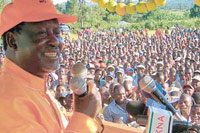Kenya’s ODM: Will the Center Hold?

The lingering cold war between Prime Minister Raila Odinga and his erstwhile ally William Ruto has finally flared up into an open war of wits. Raila’s position on the Waki Report and the planned eviction of squatters from the Mau Forest have given Ruto ample ammunition to publicly take on the Prime Minister. Ruto has threatened to lead Rift Valley ODM parliamentarians in a mass walkout from the party and trigger the eventual break-up of the country’s largest parliamentary party.
The Prime Minister has consistently supported the full implementation of the Waki report while Ruto and a cabal of ODM MPs, mainly from the Rift valley have opposed its full implementation on the grounds that such a move would target ODM leaders and its rank and file who engaged in violent mass protests at the behest of the Prime Minister. They contend that without their call for mass action and the resultant massive violence witnessed in January this year, Raila would not be Prime Minister. Some of Raila’s backers have urged him to be cautious arguing that his position on the two issues could split the party and threaten the lifeline of the Grand Coalition Government.
 |
| ODM Party Leader during Campaigns |
When KANU lost power in 2002, Ruto and other orphans of the Moi regime found themselves in the cold and isolated from the corridors of power. President Kibaki’s State House was closed to them and they lost the political and economic advantages they were used to. Rallying support for Raila in 2007 was only a convenient way of hitting back at Kibaki and his GEMA people. Ruto and his friends find themselves in unfamiliar territory where leaders are being called to account for their overt and covert actions. With the threat that the Waki report might take an international dimension, they find themselves in an awkward position and they naturally expect the Prime Minister to come to their rescue.
But can the Prime Minister really protect them? Raila cannot afford to dismiss the Waki report. This would be tantamount to supporting the roasting alive of innocent women and children in a church building in Eldoret and the brutal killings of entire families in Naivasha. It would be a betrayal of the thousands of widowed, orphaned and displaced women and children. It can splotch his illustrious career as a champion for democratic freedoms, equality and justice. The report is now beyond his authority. The Waki Commission is a creation of a negotiated politico-legal settlement, mid-wifed by the international community after the constitutional order that existed in December 2007 failed to guarantee or protect the lives, property and freedoms of Kenyans. Neither President Kibaki nor Prime Minister Raila Odinga can dismiss this report since the legitimacy of their constitutional and political authority over Kenya resulted from international mediation.
William Ruto is just playing the ethnic card to obviate investigations into gross violations of human rights which border on genocide and crimes against humanity. Raila’s threat to resign if his supporters in Rift Valley are arrested and detained over the Waki report (while speaking on KASS FM, a popular vernacular radio in the expansive Rift Valley province) were a mere play to the gallery.
The Prime Minister should demonstrate national leadership. He took an oath of office to defend the negotiated constitutional dispensation in the Republic of Kenya and to protect the lives and rights of every citizen. The split between him and Ruto is inevitable. The Waki report has only stoked the fires for the ultimate implosion of political union that was strained from the very beginning.
Capt. (Rtd) Collins Wanderi
Advocate, Commissioner For Oaths, Notary Public.
